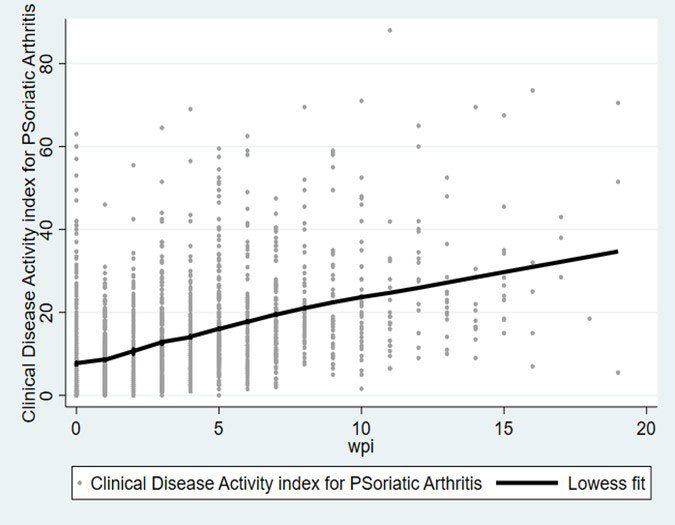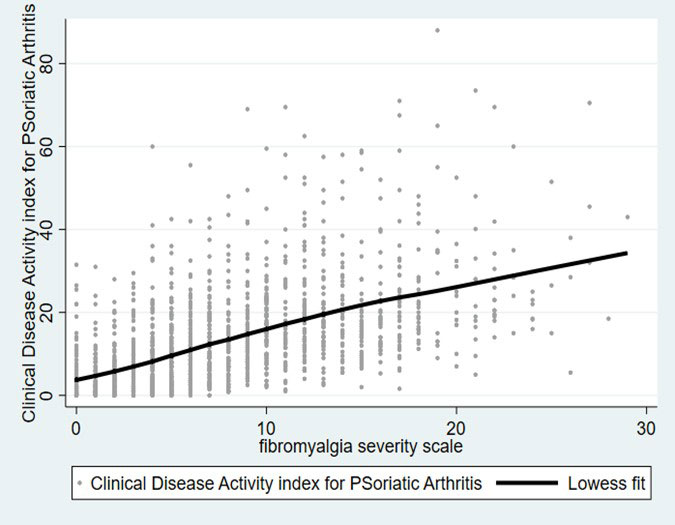Session Information
Session Type: Poster Session C
Session Time: 1:00PM-3:00PM
Background/Purpose: Fibromyalgia (FM) occurs concomitantly with inflammatory rheumatic disease, including psoriatic arthritis (PsA), in up to 20% of patients and chronic widespread pain (CWP) in up to 36%1. These conditions amplify subjective measures of disease severity and inhibit achievement of targets of low disease activity or remission, thus confounding assessment of disease activity and response to therapy. Assessment of FM and CWP as part of clinical care can illuminate the influence of these conditions on disease severity assessment and treatment response, aiding clinical decision-making.
Methods: The CorEvitas PsA and AxSpA registry download of October 1, 2021 was used for these analyses. Subjects were enrolled from 65 sites in 30 US states. The registry is supported by unrestricted funding from pharmaceutical companies; it maintains independent control of data. Since 5/2020 the Widespread Pain Index (WPI) and Symptom Severity Scale (SSS) have been administered to subjects2,3. CWP is defined as a WPI score ≥ 7 (out of 19) in at least 4/5 body regions. Fibromyalgia Severity Score (FSS) is the sum of WPI and SSS, with FM defined as CWP and WPI ≥ 7 and SSS ≥ 5, or 4 ≤ WPI ≤ 6 and SSS ≥ 9. Patient sociodemographic and clinical characteristics were compared between those with and without FM. Continuous measures were compared using a t-test and categorical characteristics compared using Fisher’s exact test. A lowess curve was estimated with a bandwidth of 0.8 to compare the association of clinical Disease Activity Index for Psoriatic Arthritis (cDAPSA) and its components with continuous measures WPI, SSS and FSS. Spearman rank correlations were estimated among the continuous measures.
Results: Of 4,250 PsA patients, 2,268 had a visit after 5/2020. Of these, 1823 had complete data on cDAPsA and WPI. Of the 1823, 1547 had SSS scores, allowing FSS calculation. CWP was reported in 13.4% of patients (245/1823) and FM in 10.4% of patients (189/1816). Patient characteristics associated with the presence of CWP and FM included female sex, worse physical function, obesity, number of comorbidities, low employment, presence of axial PsA, and depression and/or anxiety. Patients with FM demonstrate worse disease activity scores (Table 1). Lowess scores demonstrate that WPI and FSS are on a continuum (Figures 1 and 2).
Conclusion: CWP and FM were found in 13.4% and 10.4%, respectively, in a large cohort of PsA patients in the CorEvitas registry. Female sex, depression, anxiety, obesity, axial disease and comorbidities were associated with presence of CWP and FM. Assessments of disease severity that included subjective measures, including cDAPSA, patient global and pain, and tender joint count, in patients with CWP and FM were more severe than in those without. Recognition of the presence of these conditions should be factored into evaluation of clinical status as they are unlikely to respond to treatments directed at inflammation but can affect severity metrics. This study highlights the importance of recognizing and measuring CWP and FM in order to accurately assess and appropriately guide treatment in our patients.
1Mease P. Curr Opin Rheumatol. 2017. 29:304-310
2Wolfe F, et al. Sem Arth Rheum. 2016. 46:319-329
3Wolfe F, et al. Scand J Pain. 2019. 20:77-86
To cite this abstract in AMA style:
Mease P, Ogdie A, Pappas D, Reed G, Kremer J. Prevalence and Impact of Widespread Pain and Fibromyalgia on Measurement of Disease Severity in Psoriatic Arthritis: Lessons from the CorEvitas Registry [abstract]. Arthritis Rheumatol. 2022; 74 (suppl 9). https://acrabstracts.org/abstract/prevalence-and-impact-of-widespread-pain-and-fibromyalgia-on-measurement-of-disease-severity-in-psoriatic-arthritis-lessons-from-the-corevitas-registry/. Accessed .« Back to ACR Convergence 2022
ACR Meeting Abstracts - https://acrabstracts.org/abstract/prevalence-and-impact-of-widespread-pain-and-fibromyalgia-on-measurement-of-disease-severity-in-psoriatic-arthritis-lessons-from-the-corevitas-registry/



